Socialization Socialization • Is the process

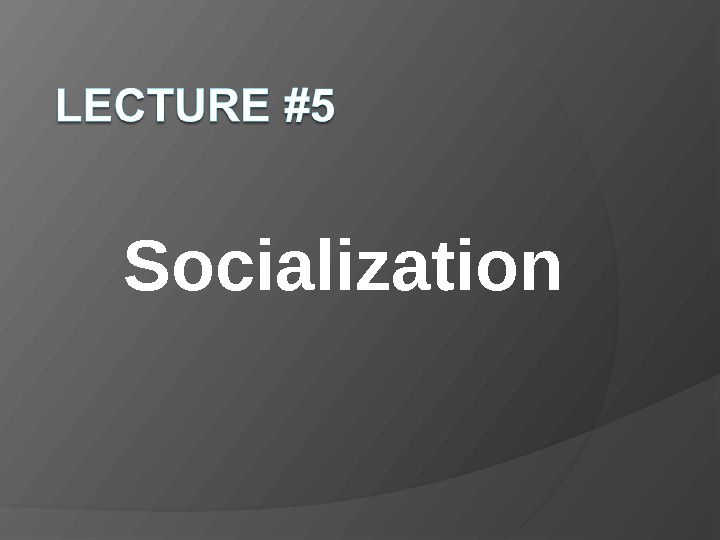
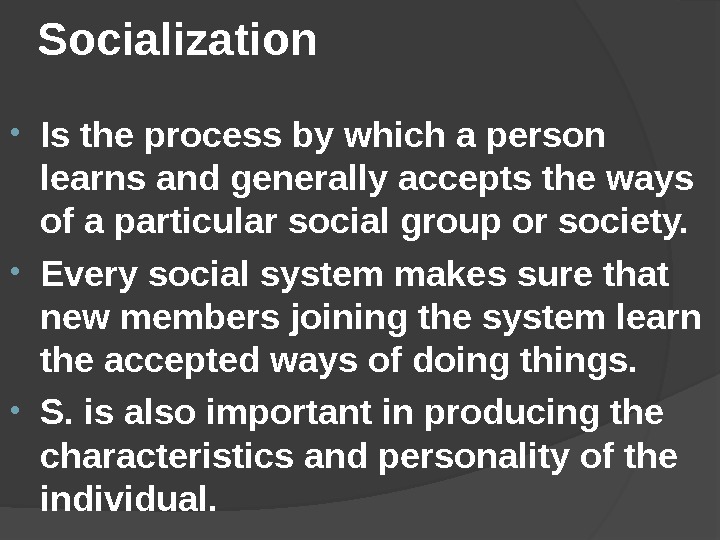
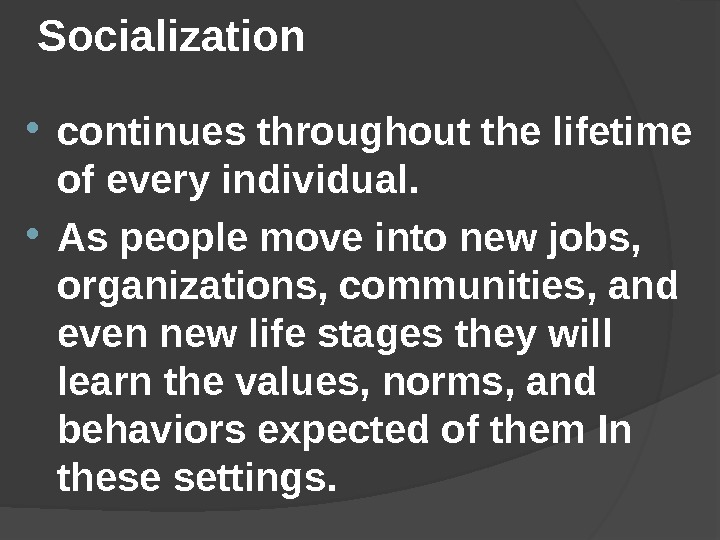
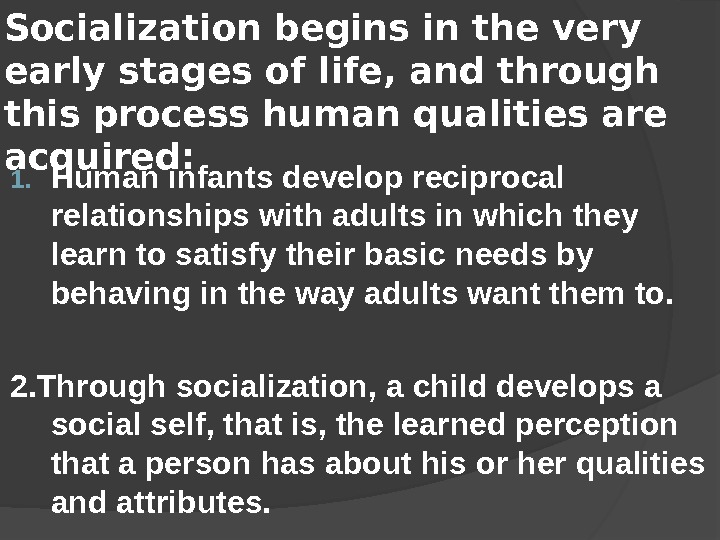
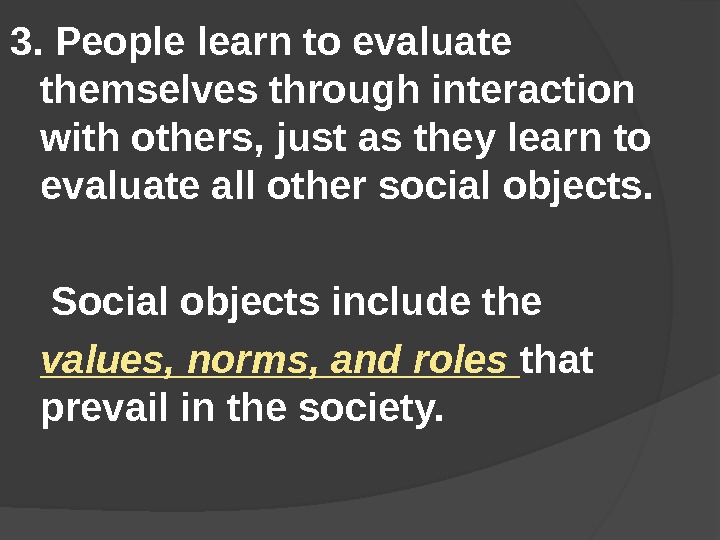
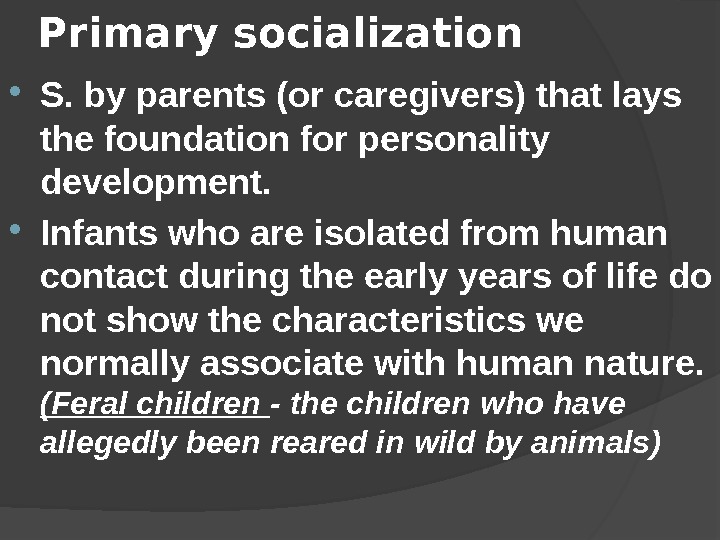
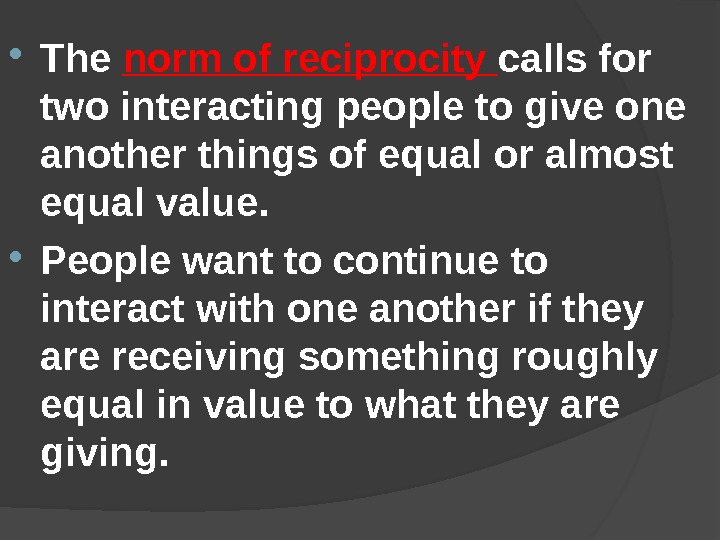
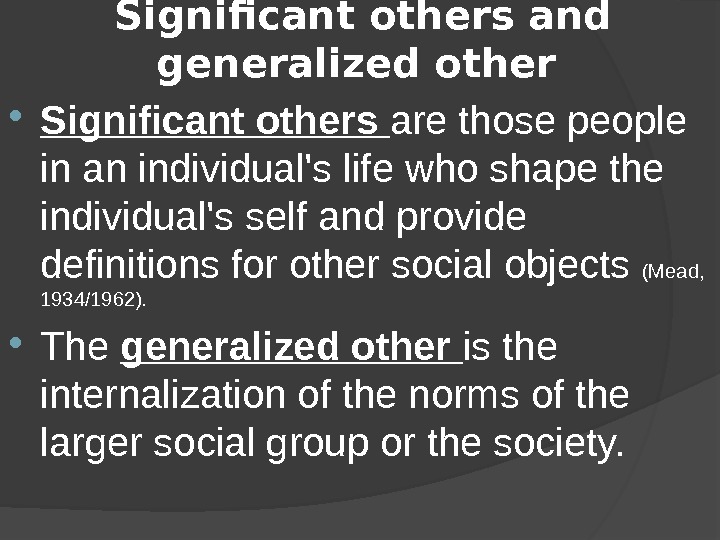
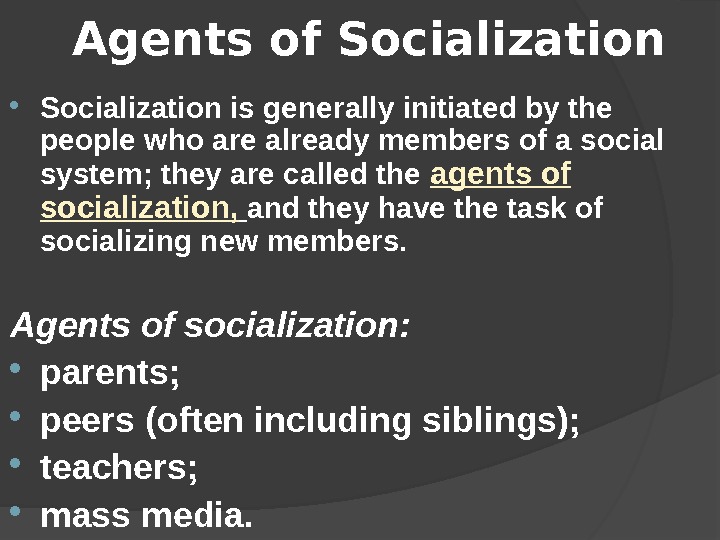
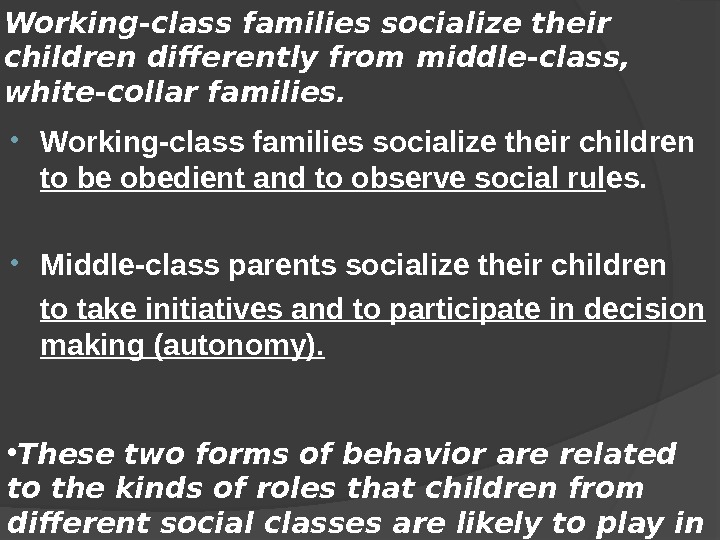
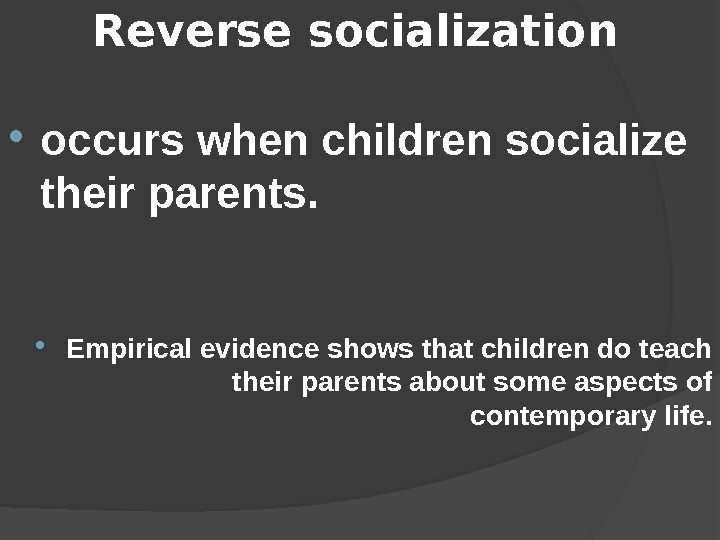
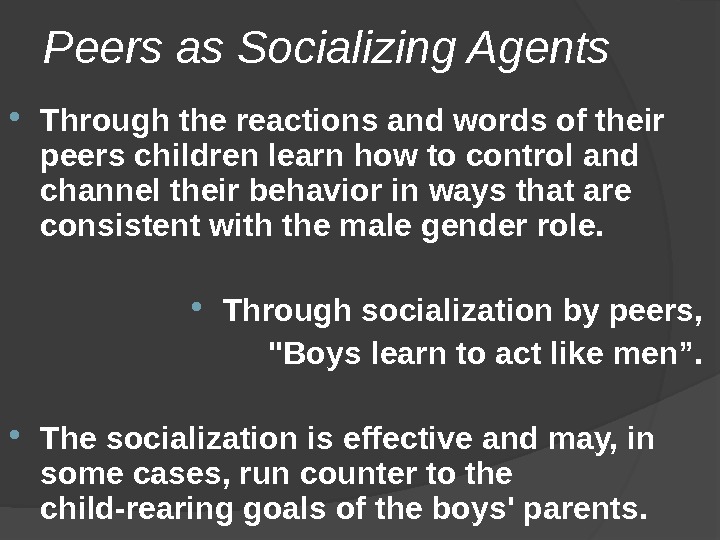
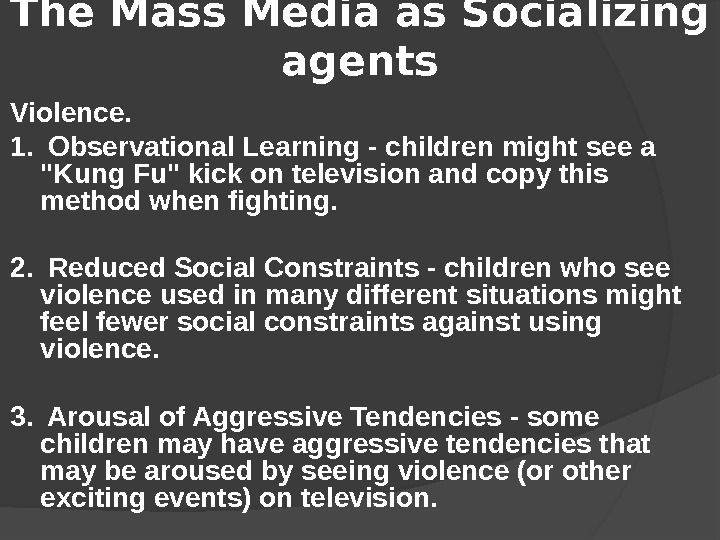
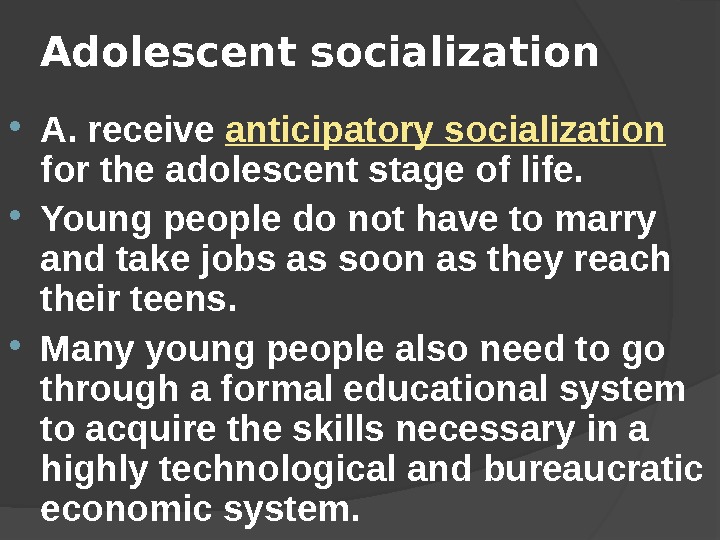
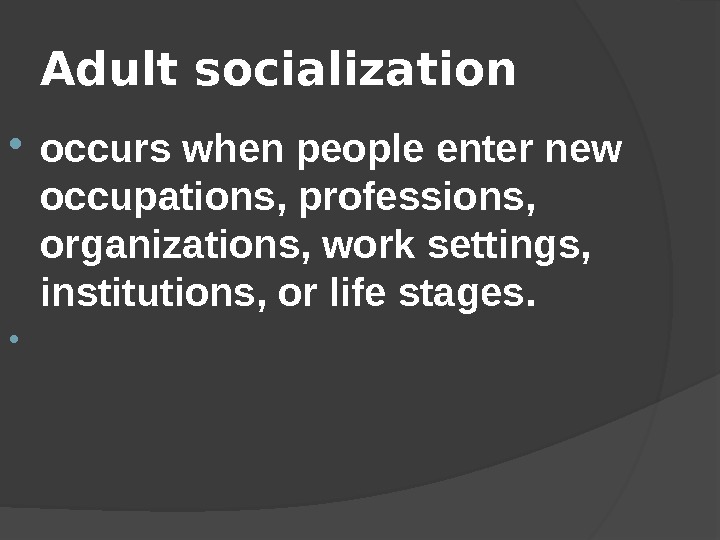
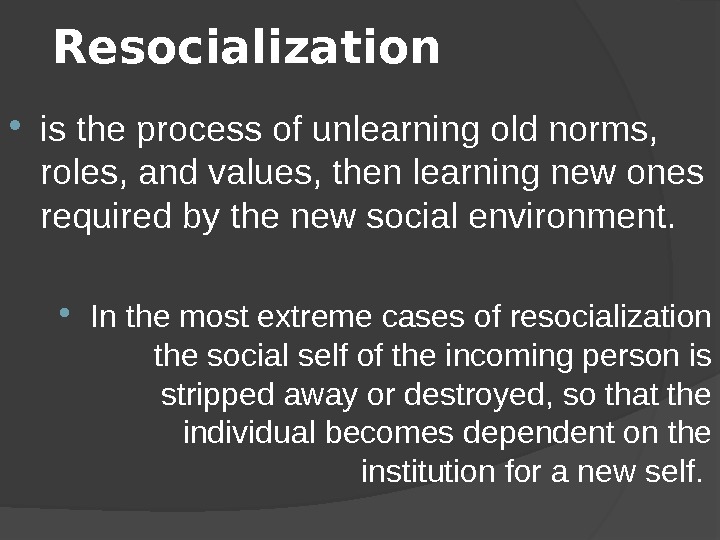
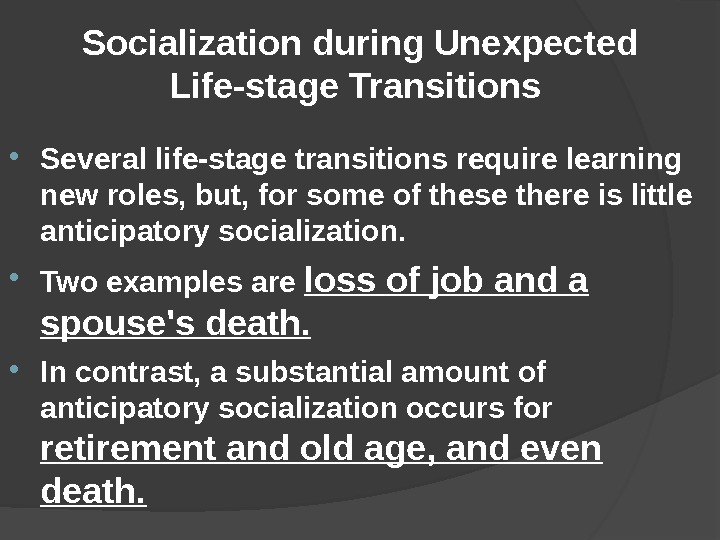
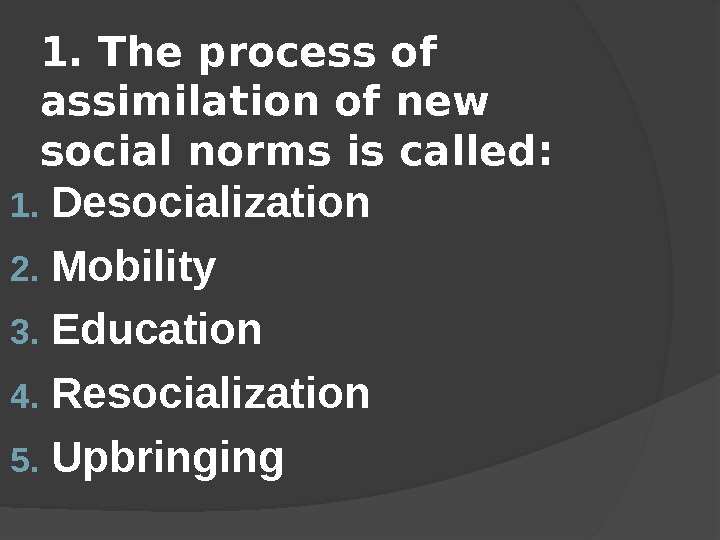

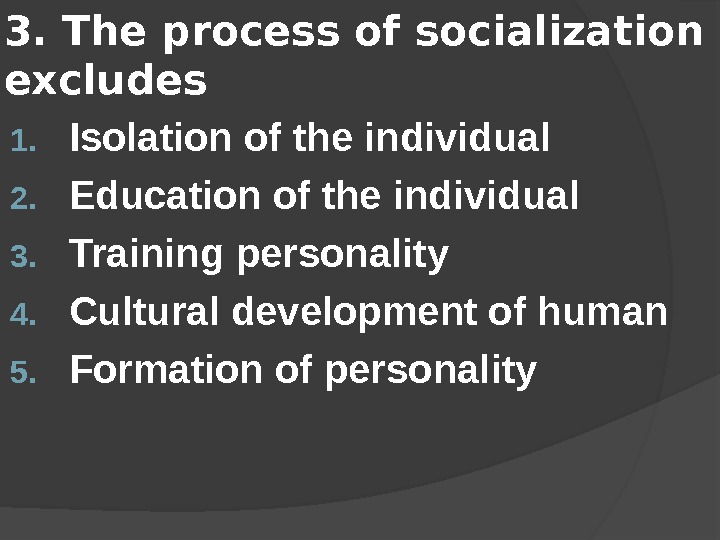
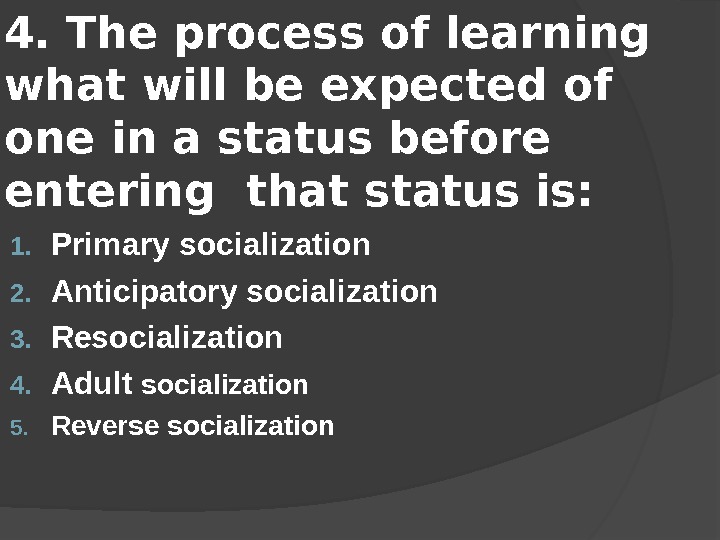
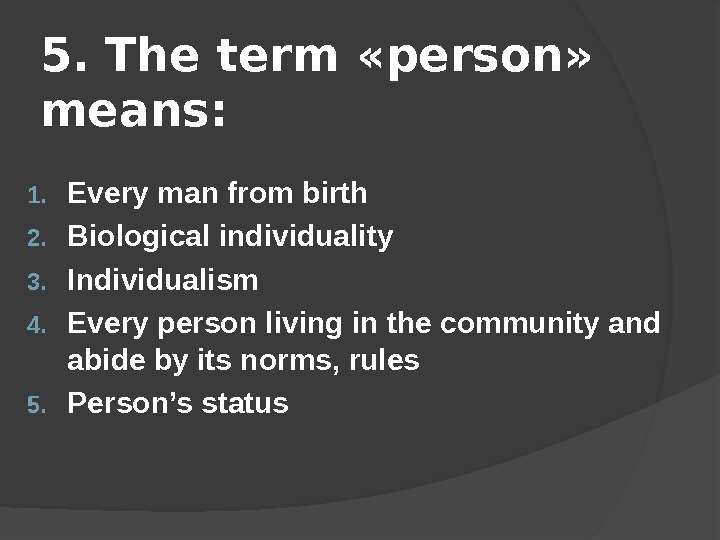
- Размер: 321.5 Кб
- Количество слайдов: 22
Описание презентации Socialization Socialization • Is the process по слайдам
 Socialization
Socialization
 Socialization • Is the process by which a person learns and generally accepts the ways of a particular social group or society. • Every social system makes sure that new members joining the system learn the accepted ways of doing things. • S. is also important in producing the characteristics and personality of the individual.
Socialization • Is the process by which a person learns and generally accepts the ways of a particular social group or society. • Every social system makes sure that new members joining the system learn the accepted ways of doing things. • S. is also important in producing the characteristics and personality of the individual.
 Socialization continues throughout the lifetime of every individual. As people move into new jobs, organizations, communities, and even new life stages they will learn the values, norms, and behaviors expected of them In these settings.
Socialization continues throughout the lifetime of every individual. As people move into new jobs, organizations, communities, and even new life stages they will learn the values, norms, and behaviors expected of them In these settings.
 Socialization begins in the very early stages of life, and through this process human qualities are acquired : 1. Human infants develop reciprocal relationships with adults in which they learn to satisfy their basic needs by behaving in the way adults want them to. 2. Through socialization, a child develops a social self, that is, the learned perception that a person has about his or her qualities and attributes.
Socialization begins in the very early stages of life, and through this process human qualities are acquired : 1. Human infants develop reciprocal relationships with adults in which they learn to satisfy their basic needs by behaving in the way adults want them to. 2. Through socialization, a child develops a social self, that is, the learned perception that a person has about his or her qualities and attributes.
 3. People learn to evaluate themselves through interaction with others, just as they learn to evaluate all other social objects. Social objects include the values, norms, and roles that prevail in the society.
3. People learn to evaluate themselves through interaction with others, just as they learn to evaluate all other social objects. Social objects include the values, norms, and roles that prevail in the society.
 Primary socialization S. by parents (or caregivers) that lays the foundation for personality development. Infants who are isolated from human contact during the early years of life do not show the characteristics we normally associate with human nature. (Feral children — the children who have allegedly been reared in wild by animals)
Primary socialization S. by parents (or caregivers) that lays the foundation for personality development. Infants who are isolated from human contact during the early years of life do not show the characteristics we normally associate with human nature. (Feral children — the children who have allegedly been reared in wild by animals)
 The norm of reciprocity calls for two interacting people to give one another things of equal or almost equal value. People want to continue to interact with one another if they are receiving something roughly equal in value to what they are giving.
The norm of reciprocity calls for two interacting people to give one another things of equal or almost equal value. People want to continue to interact with one another if they are receiving something roughly equal in value to what they are giving.
 Significant others and generalized other Significant others are those people in an individual’s life who shape the individual’s self and provide definitions for other social objects (Mead, 1934/1962). The generalized other is the internalization of the norms of the larger social group or the society.
Significant others and generalized other Significant others are those people in an individual’s life who shape the individual’s self and provide definitions for other social objects (Mead, 1934/1962). The generalized other is the internalization of the norms of the larger social group or the society.
 Agents of Socialization is generally initiated by the people who are already members of a social system; they are called the agents of socialization, and they have the task of socializing new members. Agents of socialization: parents; peers (often including siblings); teachers; mass media.
Agents of Socialization is generally initiated by the people who are already members of a social system; they are called the agents of socialization, and they have the task of socializing new members. Agents of socialization: parents; peers (often including siblings); teachers; mass media.
 Working-class families socialize their children differently from middle-class, white-collar families. • Working-class families socialize their children to be obedient and to observe social rul es. • Middle-class parents socialize their children to take initiatives and to participate in decision making (autonomy). • These two forms of behavior are related to the kinds of roles that children from different social classes are likely to play in the adult work world.
Working-class families socialize their children differently from middle-class, white-collar families. • Working-class families socialize their children to be obedient and to observe social rul es. • Middle-class parents socialize their children to take initiatives and to participate in decision making (autonomy). • These two forms of behavior are related to the kinds of roles that children from different social classes are likely to play in the adult work world.
 Reverse socialization occurs when children socialize their parents. Empirical evidence shows that children do teach their parents about some aspects of contemporary life.
Reverse socialization occurs when children socialize their parents. Empirical evidence shows that children do teach their parents about some aspects of contemporary life.
 Peers as Socializing Agents Through the reactions and words of their peers children learn how to control and channel their behavior in ways that are consistent with the male gender role. Through socialization by peers, «Boys learn to act like men”. The socialization is effective and may, in some cases, run counter to the child-rearing goals of the boys’ parents.
Peers as Socializing Agents Through the reactions and words of their peers children learn how to control and channel their behavior in ways that are consistent with the male gender role. Through socialization by peers, «Boys learn to act like men”. The socialization is effective and may, in some cases, run counter to the child-rearing goals of the boys’ parents.
 The Mass Media as Socializing agents Violence. 1. Observational Learning — children might see a «Kung Fu» kick on television and copy this method when fighting. 2. Reduced Social Constraints — children who see violence used in many different situations might feel fewer social constraints against using violence. 3. Arousal of Aggressive Tendencies — some children may have aggressive tendencies that may be aroused by seeing violence (or other exciting events) on television.
The Mass Media as Socializing agents Violence. 1. Observational Learning — children might see a «Kung Fu» kick on television and copy this method when fighting. 2. Reduced Social Constraints — children who see violence used in many different situations might feel fewer social constraints against using violence. 3. Arousal of Aggressive Tendencies — some children may have aggressive tendencies that may be aroused by seeing violence (or other exciting events) on television.
 Adolescent socialization A. receive anticipatory socialization for the adolescent stage of life. Young people do not have to marry and take jobs as soon as they reach their teens. Many young people also need to go through a formal educational system to acquire the skills necessary in a highly technological and bureaucratic economic system.
Adolescent socialization A. receive anticipatory socialization for the adolescent stage of life. Young people do not have to marry and take jobs as soon as they reach their teens. Many young people also need to go through a formal educational system to acquire the skills necessary in a highly technological and bureaucratic economic system.
 Adult socialization occurs when people enter new occupations, professions, organizations, work settings, institutions, or life stages.
Adult socialization occurs when people enter new occupations, professions, organizations, work settings, institutions, or life stages.
 Resocialization is the process of unlearning old norms, roles, and values, then learning new ones required by the new social environment. In the most extreme cases of resocialization the social self of the incoming person is stripped away or destroyed, so that the individual becomes dependent on the institution for a new self.
Resocialization is the process of unlearning old norms, roles, and values, then learning new ones required by the new social environment. In the most extreme cases of resocialization the social self of the incoming person is stripped away or destroyed, so that the individual becomes dependent on the institution for a new self.
 Socialization during Unexpected Life-stage Transitions Several life-stage transitions require learning new roles, but, for some of these there is little anticipatory socialization. Two examples are loss of job and a spouse’s death. In contrast, a substantial amount of anticipatory socialization occurs for retirement and old age, and even death.
Socialization during Unexpected Life-stage Transitions Several life-stage transitions require learning new roles, but, for some of these there is little anticipatory socialization. Two examples are loss of job and a spouse’s death. In contrast, a substantial amount of anticipatory socialization occurs for retirement and old age, and even death.
 1. The process of assimilation of new social norms is called : 1. Desocialization 2. Mobility 3. Education 4. Resocialization 5. Upbringing
1. The process of assimilation of new social norms is called : 1. Desocialization 2. Mobility 3. Education 4. Resocialization 5. Upbringing
 2. Agents of primary socialization : 1. School 2. Media 3. Parents 4. Peers 5. Siblings
2. Agents of primary socialization : 1. School 2. Media 3. Parents 4. Peers 5. Siblings
 3. The process of socialization excludes 1. I solation of the individual 2. E ducation of the individual 3. Training personality 4. C ultural development of human 5. F ormation of personality
3. The process of socialization excludes 1. I solation of the individual 2. E ducation of the individual 3. Training personality 4. C ultural development of human 5. F ormation of personality
 4. The process of learning what will be expected of one in a status before entering that status is: 1. Primary socialization 2. Anticipatory socialization 3. Resocialization 4. Adult socialization 5. Reverse socialization
4. The process of learning what will be expected of one in a status before entering that status is: 1. Primary socialization 2. Anticipatory socialization 3. Resocialization 4. Adult socialization 5. Reverse socialization
 5. The term « person » means : 1. Every man from birth 2. Biological individuality 3. Individualism 4. Every person living in the community and abide by its norms, rules 5. Person’s status
5. The term « person » means : 1. Every man from birth 2. Biological individuality 3. Individualism 4. Every person living in the community and abide by its norms, rules 5. Person’s status

